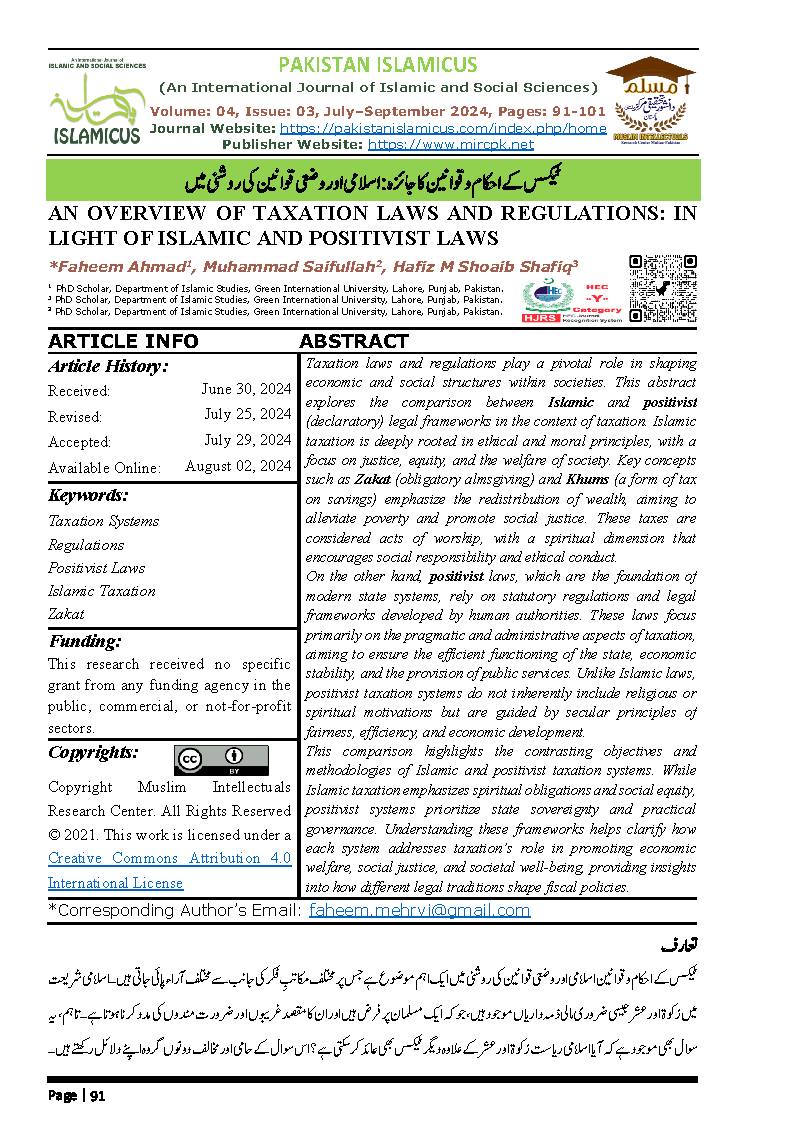ٹیکس کے احکام و قوانین کا جائزہ : اسلامی اور وضعی قوانین کی روشنی میں
AN OVERVIEW OF TAXATION LAWS AND REGULATIONS: IN LIGHT OF ISLAMIC AND POSITIVIST LAWS
Keywords:
Taxation Systems, Regulations, Positivist Laws, Islamic Taxation, Zakat.Abstract
Taxation laws and regulations play a pivotal role in shaping economic and social structures within societies. This abstract explores the comparison between Islamic and positivist (declaratory) legal frameworks in the context of taxation. Islamic taxation is deeply rooted in ethical and moral principles, with a focus on justice, equity, and the welfare of society. Key concepts such as Zakat (obligatory almsgiving) and Khums (a form of tax on savings) emphasize the redistribution of wealth, aiming to alleviate poverty and promote social justice. These taxes are considered acts of worship, with a spiritual dimension that encourages social responsibility and ethical conduct.
On the other hand, positivist laws, which are the foundation of modern state systems, rely on statutory regulations and legal frameworks developed by human authorities. These laws focus primarily on the pragmatic and administrative aspects of taxation, aiming to ensure the efficient functioning of the state, economic stability, and the provision of public services. Unlike Islamic laws, positivist taxation systems do not inherently include religious or spiritual motivations but are guided by secular principles of fairness, efficiency, and economic development.
This comparison highlights the contrasting objectives and methodologies of Islamic and positivist taxation systems. While Islamic taxation emphasizes spiritual obligations and social equity, positivist systems prioritize state sovereignty and practical governance. Understanding these frameworks helps clarify how each system addresses taxation’s role in promoting economic welfare, social justice, and societal well-being, providing insights into how different legal traditions shape fiscal policies.
Downloads
References
Sūrat al-Rūm 38:30
Sūrat al-Dhāriyāt 19:51
Sūrat al-Baqarah 219:2
Tirmidhī, Imām Muḥammad bin ʿĪsā Tirmidhī (m: 279 AH), Jāmiʿ al-Tirmidhī, Kitāb al-Ḥudūd, Bāb Mā Jāʾa fī al-Satr ʿala al-Muslim, Beirut, Dār al-Fikr, July 2016, J 3, p. 115.
Bukhārī, Imām Muḥammad bin Ismāʿīl Bukhārī (m: 256 AH), Ṣaḥīḥ Bukhārī, Beirut, Dār al-Kutub al-ʿIlmīyah, 2018, J 1, p. 187, Ḥadīth no. 1395.
Aṣbahānī, Ḥāfiẓ Abū Qāsim Ismāʿīl bin Muḥammad (m: 535 AH), al-Targhīb wa al-Tarhīb, Kitāb al-Ṣadaqāt, Bāb al-Targhīb fī Adāʾ al-Zakāh, Cairo, Dār al-Ḥadīth, 2021, Ḥadīth no. 12, J 1, p. 301.
Dr. Muḥammad Ḥamīdullāh, Dunyā kā Qadīm Tarīn Majmūʿah Ḥadīth, Beacon Books, June 2020, p. 35.
Dr. Muḥammad Ḥamīdullāh, Dunyā kā Qadīm Tarīn Majmūʿah Ḥadīth, Beacon Books, June 2020, p. 38.
Ṭabarānī, Ḥāfiẓ Sulaymān bin Aḥmad (m: 360 AH), al-Muʿjam al-Awsaṭ, Beirut, Dār al-Kutub al-ʿIlmīyah, August 2015, Ḥadīth no. 2270, J 1, p. 634.
Muslim, Imām Muslim bin Ḥajjāj Qushayrī Nishāpurī (m: 261 AH), Ṣaḥīḥ Muslim, Beirut, Dār Ibn Ḥazm, November 2014, p. 234.
Al-Māwardī, Abū al-Ḥasan ʿAlī bin Muḥammad bin Ḥabīb, al-Aḥkām al-Sulṭānīyah wa al-Wilāyāt al-Dīnīyah, Kuwait, Jāmiʿah al-Kuwayt, 1409 AH, J 1, p. 145.
Shawkānī, Muḥammad bin ʿAlī, Tuḥfat al-Dhākirīn, Beirut, June 2020, Ṭabʿah Muṣaḥḥaḥah wa Munqaḥah, p. 287.
Shawkānī, Muḥammad bin ʿAlī, Tuḥfat al-Dhākirīn, Beirut, June 2020, Ṭabʿah Muṣaḥḥaḥah wa Munqaḥah, p. 288.
Al-Ḥanafī, ʿAllāmah Abū Bakr Aḥmad bin ʿAlī al-Rāzī al-Jaṣṣāṣ al-Ḥanafī, Aḥkām al-Qurʾān, Islamabad, Sharīʿah Academy, November 2015, p. 121.
Al-Hindī, ʿAllāmah ʿAlāʾ al-Dīn ʿAlī Muttaqī Hindī (m: 975 AH), Kanz al-ʿUmmāl, Beirut, Dār al-Kutub al-ʿIlmīyah, December 2009, p. 98.
Sūrat al-Rūm 38:30
Sūrat al-Dhāriyāt 19:51
Sūrat al-Baqarah 219:2
Sūrat al-Baqarah 177:2
Sūrat al-Maʿārij 24–25:70
Bukhārī, Imām Muḥammad bin Ismāʿīl (m: 256 AH), Ṣaḥīḥ Bukhārī, Beirut, Dār al-Kutub al-ʿIlmīyah, 2018, J 1, p. 200.
Bukhārī, Imām Muḥammad bin Ismāʿīl (m: 256 AH), Ṣaḥīḥ Bukhārī, Beirut, Dār al-Kutub al-ʿIlmīyah, 2018, J 1, p. 207.
Ibrāhīm Muṣṭafā, al-Muʿjam al-Wasīṭ, Turkey, Dār al-Daʿwah, 1989 AH, J 1, p. 421.
Al-Ghazālī, Abū Ḥāmid Ghazālī, Maqāṣid al-Falāsifah, Beirut, Dār al-Kutub al-ʿIlmīyah, 2021, p. 33.
Al-Marghīnānī, Burhān al-Dīn ʿAlī bin Abī Bakr al-Marghīnānī (m: 593 AH), al-Hidāyah, Lahore, Maktabah Raḥmānīyah, 2020, p. 363.

Downloads
Published
Issue
Section
License
Copyright (c) 2024 PAKISTAN ISLAMICUS (An International Journal of Islamic & Social Sciences)

This work is licensed under a Creative Commons Attribution 4.0 International License.
This work is licensed under a Creative Commons Attribution 4.0 International License.
































